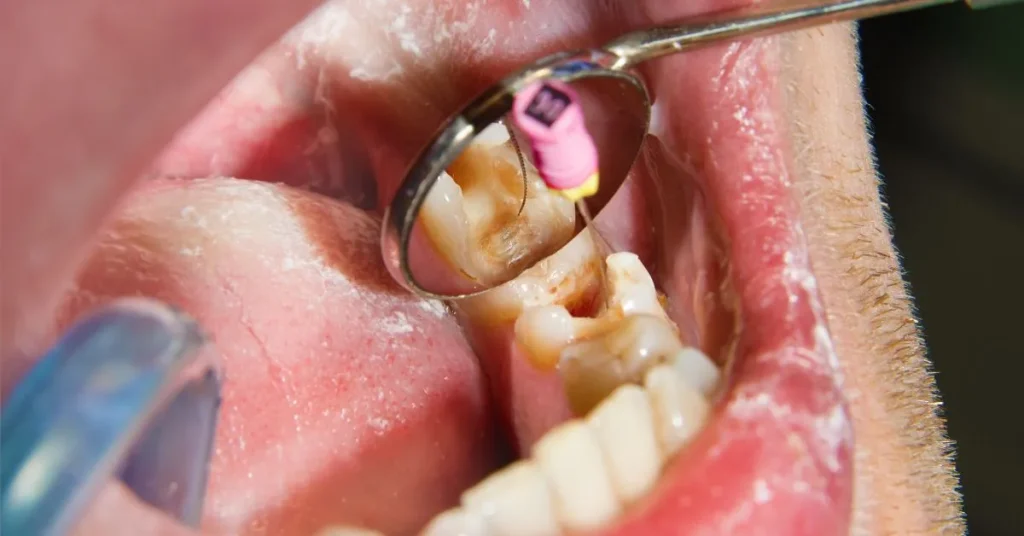The Difference Between Laser & Traditional Root Canal Treatment
Did you know that over 15 million root canal procedures are performed worldwide each year, making it one of the most common dental treatments? While many people associate root canals with discomfort, modern techniques like laser-assisted treatments are changing perceptions and improving patient experiences.
In this article, we’ll break down the key differences between laser and traditional root canal treatment, so you can make an informed choice for your dental health.
What Is Root Canal Treatment?
A root canal treatment is a procedure that removes infected or inflamed tissue from inside a tooth, cleans and disinfects the space, and seals it to prevent further infection. It’s often necessary when:
- You have deep decay or cavities.
- A tooth has been cracked or injured.
- An untreated infection has reached the pulp (the inner part of the tooth).
The goal is to save your natural tooth and restore function while eliminating pain.

Traditional Root Canal Treatment: The Basics
Traditional root canal therapy has been used for decades and involves:
- Manual cleaning: Dentists use small files to remove infected tissue from the canals.
- Irrigation: Antibacterial solutions are flushed through the canals to disinfect them.
- Sealing: The space is filled and sealed to prevent reinfection.
While effective, this method can sometimes be time-intensive, and achieving complete disinfection in complex canal systems may be challenging.
Laser Root Canal Treatment: A Modern Approach
Laser-assisted root canal treatment uses focused light energy to enhance the cleaning and disinfection process. It involves:
- Laser cleaning: A laser is used to remove bacteria and infected tissue with precision.
- Enhanced sterilisation: The laser’s heat helps sterilise the canals more thoroughly than traditional irrigation.
- Less manual work: Fewer mechanical files may be needed, as the laser can reach hard-to-access areas.
This advanced method is growing in popularity for its efficiency and patient comfort.
Key Differences Between Laser & Traditional Root Canal Treatments
| Feature | Traditional Root Canal | Laser Root Canal |
| Cleaning method | Manual filing and chemical irrigation | Laser energy for cleaning and sterilisation |
| Precision | Limited to file access | Higher precision in complex canals |
| Discomfort | May cause more post-treatment sensitivity | Often associated with reduced discomfort |
| Treatment time | Typically 1–2 visits | May shorten treatment duration |
| Sterilisation level | Chemical disinfectants used | Enhanced sterilisation with laser heat |
| Cost | Generally lower | May be higher due to advanced technology |
Advantages of Laser Root Canal Treatment
✅ Better Sterilisation: The laser reaches microscopic bacteria in tiny canal branches that files and irrigation might miss.
✅ Reduced Discomfort: Patients often report less post-operative sensitivity and swelling due to the laser’s gentle action.
✅ Faster Healing: The laser stimulates tissue repair and reduces inflammation, supporting quicker recovery.
✅ Fewer Appointments: In some cases, laser treatment can complete the process in a single visit.
When Choosing a Traditional Root Canal Is Still the Right Call
While lasers offer clear benefits, traditional root canal treatment remains a reliable choice for many patients, especially when:
- Access to laser technology is limited.
- Cost is a major consideration.
- The infection is straightforward and doesn’t involve complex canal systems.
Your dentist will recommend the best option based on your tooth’s condition and your individual needs.
Which One Should You Choose?
The choice between traditional and laser root canal treatments depends on:
- Your dentist’s expertise and equipment.
- Your budget and expectations.
- The complexity of your infection.
At Rouse Hill Smiles Dental Care, our experienced team offers both options and will guide you towards the most suitable treatment to ensure the best results and comfort.
Both traditional and laser root canal treatments aim to save your tooth and restore your oral health, but laser technology offers a modern upgrade with added precision and comfort.
Choosing the right option depends on your individual needs and your dentist’s advice.
At Rouse Hill Smiles Dental Care, we combine expertise with advanced technology to provide gentle and effective care. Whether you need a traditional or laser root canal, we’ll help you smile with confidence again. Call us today or book online to discuss which treatment is right for you!
Frequently Asked Questions
1. Is laser root canal treatment better than traditional?
Laser root canal treatment offers enhanced sterilisation, reduced discomfort, and potentially faster healing. However, traditional methods are still highly effective and may be more accessible for certain cases.
2. Does laser root canal hurt less?
Many patients report less pain and sensitivity during and after laser-assisted procedures due to its precision and gentle action on tissues.
3. How do I know if I need a root canal?
Signs include severe tooth pain, prolonged sensitivity to hot or cold, swelling around the gums, or darkening of the tooth. Visit our dentist for a proper diagnosis.
Our Principal Dentist
Dr. Teena and the Rouse Hill Smiles team are dedicated to providing patients of all ages with the highest quality of care.

Dr. Teena Bali
Dentist
Quick Contacts
- Rouse Hill Plaza G07-G08, 2-4 Aberdour Avenue Rouse Hill, NSW 2155
- enquiries@rousehillsmilesdentalcare.com.au
- (02) 8320 0548
- Copyright 2025 Rouse Hill Smiles Dental Care







